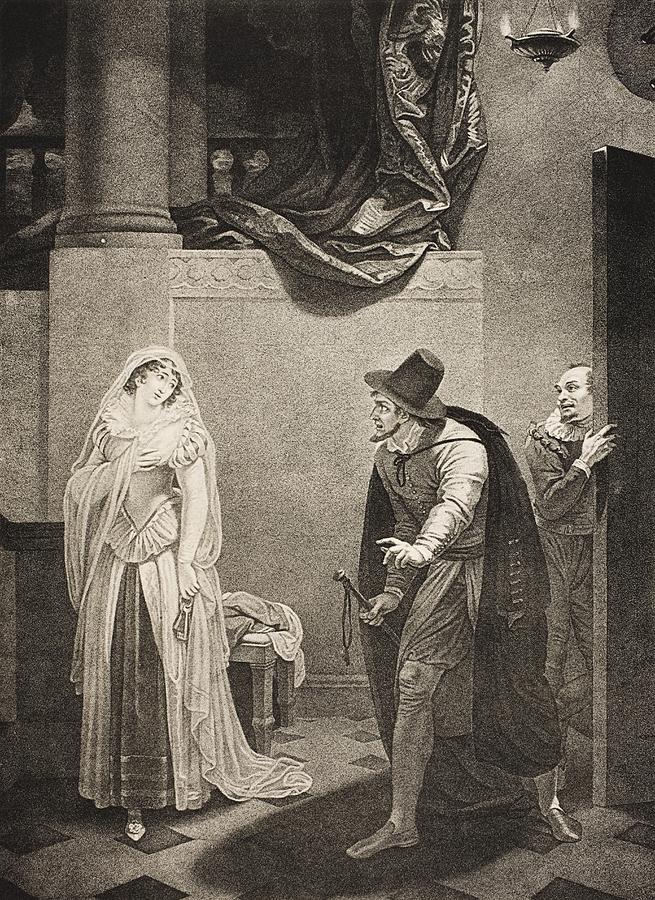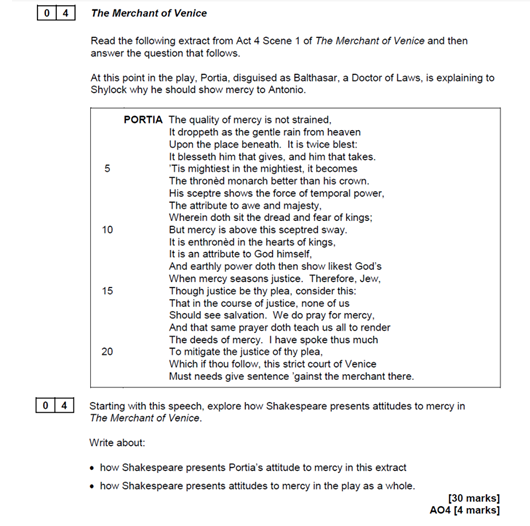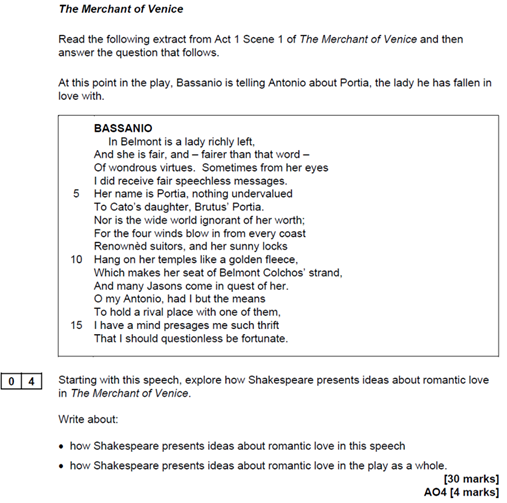GCSE English
Play Analysis – The Merchant of Venice

William Shakespeare’s Merchant of Venice is one of Shakespeare’s greatest comedies. The story of the two friends Antonio and Bassanio on their quest for love and fortune is a favourite amongst exam boards. When getting to grips with one of the most iconic plays, it is important to have a good understanding of how the effectively analyse the play. This article will show how to analyse Othello in a manner that will ensure GCSE success.
Studying Shakespeare is often overwhelming to a lot of students. Understanding Elizabethan language is one of the key challenges when studying Shakespear, there is also the importance of the key themes to remember and important quotations to memorise. So, if you find you’re struggling with Othello then don’t panic, you are not the only one.
When it comes to revising for The Merchant of Venice, we suggest that students make sure they understand the key characters of the play. The characters and their attitudes as well as what are the key themes throughout, always play a key part in the exam questions. It also helps to revisit the plot of the play before the exam. When analysing The Merchant of Venice it is very important to understand the key themes, this will help to interpret the play in the correct way.

What is the plot of The Merchant of Venice?
The Merchant of Venice was written between 1596 and 1599 by English playwright William Shakespeare. The play is set in the northern Italian city of Venice, where an anti-Semitic merchant named Antonio takes out a loan from Shylock the Jew to help his friend Bassanio to court a young lady named Portia. Antonio is unable to repay the loan, so Shylock demands a pound of his flesh as per the contract signed. After Portia and Bassanio marry, they hatch a plan in order to help Antonio. Portia dresses up as a male lawyer to try and trick Shylock into cancelling the loan, freeing Antonio, and banishing Shylock from the city.
The main themes of The Merchant of Venice:
Friendship:
The theme of friendship is very important in The Merchant of Venice because it sees friends risking their lives to help each other. Bassanio needs financial support and turns to his friend Antonio for help, even agreeing to giving Shylock a pound of his flesh if he is unable to repay the loan. The play depicts friendship as an intense emotional bond; the friendship of Antonio and Bassanio is so strong that it is deeper than dramatic love. The topic of friendship is also explored between Bassanio and Gratiano, and Portia and Nerissa. Both Gratiano and Nerissa show loyalty towards their friends, and the double marriage at the ends shows that the bond of friendship will never be broken.
Important friendship quotes:
- To you, Antonio, I owe the most in money and in love, / And from your love I have a warranty / To unburden all my plots and purposes / How to get clear of all the debts I owe. (Act 1, Scene 1)
- You shall not seal to such a bond for me! / I’ll rather dwell in my necessity. (Act 1, Scene 3)
- There are some shrewd contents in yond same paper / That steals the color from Bassanio’s cheek. / Some dear friend dead, else nothing in the world / Could turn so much the constitution / Of any constant man. (Act 3, Scene 2)
- My Lord Bassanio, let him have the ring. / Let his deservings and my love withal / Be valued ‘gainst your wife’s commandment. (Act 4, Scene 1)
Wealth:
Wealth is presented as a complex topic that can make the characters unhappy and places them in positions of disadvantage. The concept of greed is also linked to wealth and is used to show the difference between those who need money in order to live a better life, and those, like Shylock, who benefit and take advantage of these characters. Wealth also gives the characters a sense of freedom and power. For example, Portia’s wealth allows her to have the knowledge that helps trick Shylock and save her friends. Shylock is punished for his greed, while Antonio is rewarded for not letting wealth, or lack of wealth, change him as a person.
Important wealth quotes:
- In Belmont is a lady richly left, / And she is fair and – fairer than that word – / Of wondrous virtues. / Sometimes from her eyes I did receive fair speechless messages. Her name is Portia […] (Act 1, Scene 1
- You would be, sweet madam, / if your miseries were in the same abundance / as your good fortunes are. / And yet for aught I see, they are as / sick that surfeit with too much as they that starve with nothing. / It is no mean happiness, therefore, to be seated to the mean. / Superfluity comes sooner by white hairs, / but competency lives longer. (Act 1, Scene 2)
- All that glistens is not gold – / Often have you heard that told. / Many a man his life hath sold / But my outside to behold. / Gilded tombs do worms enfold. / Had you been as wise as bold / Young in limbs, in judgment old. / Your answer had not been inscrolled. (Act 2, Scene 7)
Prejudice:
The theme of prejudice is used to create divisions between the characters, particularly between the Christian characters and the Jewish character of Shylock. The majority of the characters, including Shylock’s own daughter, Jessica, deeply dislike the Jew. This feeling is mirrored by Shylock, who constantly refers to his hatred for the Christians because of the pain and suffering they have forced upon him and his people. The ultimate betrayal for Shylock is his daughter running away to marry a Christian man. The Christian characters constantly judge and belittle Shylock due to his Jewish identity. Antonio makes it clear at the beginning of the play that just because he is borrowing money from Shylock, this will not change his opinion of him and the Jewish people. After Antonio is unable to repay the loan, the Christian characters blame Shylock’s Jewish identity for his lack of mercy and refusal to compromise. Shylock is not the only outsider that is mocked by the Christians; the dark-skinned Moroccan prince that attempts to court Portia is ridiculed by her, saying she did not want anyone who looks like him to win her hand in marriage.
Important prejudice quotes:
- I am as like to call thee so again, / to spit on thee again, to spurn thee too. (Act 1, Scene 3)
- You (Antonio) call me misbeliever, cut-throat dog, / And spit upon my Jewish gabardine / And all for use of that which is my own. (Act 1, Scene 3)
- I hate him for he is a Christian. (Act 1, Scene 3)
- Let all of his complexion choose me so. (Act 2, Scene 7)
- A stony adversary, an inhuman wretch, uncapable of pity, void and empty / From any dram of mercy. (Act 4, Scene 1)
Revenge:
Revenge is a powerful and destructive force in The Merchant of Venice. Shylock wants to hurt Antonio because of his desire for revenge against the entire Christian community for the pain and suffering they have inflicted on his people. The plays shows that Shylock has been abused by the Christian community and blames them for “stealing” his daughter as well as the money she took when she ran away. Although his desire for revenge is a natural human response to being mistreated, Shylock ironically inflicts the same pain on Antonio that he accuses the Christians of inflicting upon him. Although he attempts to make it clear to the Christians that he is not different from them, his actions are controlled by his emotions, rather than logic, and he ends up loosing himself, his daughter, and his money in the process of carrying out his revenge.
Important revenge quotes:
- I will buy with you, sell with you, talk with you, walk with you, and so following; but I will not eat with you, drink with you, nor pray with you. (Act 1, Scene 3)
- I am bid forth to supper, Jessica. They are my keys. / – But wherefore should I go? / I am not bod for love. They flatter me. / But yet I’ll go in hate to feed upon / The prodigal Christian. (Act 2, Scene 5)
- If you prick us, do we not bleed? If you tickle us, do we not laugh? If you poison us, do we not die? And if you wrong us, shall we not revenge? (Act 3, Scene 1)
- If it will feed nothing else, it will feed my revenge. (Act 3, Scene 1)
- But none can drive him from the envious plea / Of forefeiture, of justice, and his bond. (Act 3, Scene 2)
The Merchant of Venice sample exam questions:


More Merchant of Venice Revision Resources:
What the examiners want to see for AO1, AO2, AO3, and AO4:
AO1:
- Use relevant quotes from both the extract and the rest of the play to support your points.
- Use quotes from other characters to show how quotes can be interpreted.
AO2:
- Analyse the language, form, and structure used by Shakespeare and the characters in The Merchant of Venice.
- How do these examples of language, form, and structure create meanings and different effects throughout the play?
- Use relevant subject terminology when you can in order to show the examiners you are able to identify the techniques you are describing.
- What theme does the question ask you to consider? Are there any other themes that are relevant to the question?
AO3:
- Show the examiner your understanding of the relationships between the text and the contexts in which it was written.
- Understand Elizabethan views on the Jewish community and how this was different to their views on the Christian community. Why did they have these views?
- How have these views changed for modern audiences?
- Understand the genre of the play: The Merchant of Venice is a comedy, but does Shylock’s story give it tragic themes or undertones?
- What would Elizabethan audiences have thought about a woman dressing up as a man in order to deceive someone? Was this tolerated because she was tricking a Jewish character?
- How do the characters present themselves to the audience? Does this change throughout the play? If so, why?
AO4:
- Remember to use a range of vocabulary and sentence structures.
- Make sure to check that your spelling and punctuation is accurate.
London’s No.1 Tuition Agency
Media coverage
Mentor Education won Tutoring Provider of the Year at the Education Investor Awards in 2022 and 2024. We also won at the National Tutoring Awards and an Entrepreneur of the Year award in 2024. We are regularly featured in the Education Press, including School Report Magazine, the Good Schools Guide, and more.
Our Clients Journeys
Case studies
With the support of our wonderful families and the expertise of a dedicated team of school entrance, GCSE and A Level tutors, we work closely with every child to help them confidently navigate their exams. Whether it’s securing a scholarship, addressing specific learning needs, aiming for a place at a competitive school, or securing the grades for university, we’re here to guide you every step of the way.
Customers love what we do
What our parents have to say about Mentor
We are so proud of our 5 star reviews and testimonials which are a testament to the relationships our teachers build with their pupils and the success they create together.


